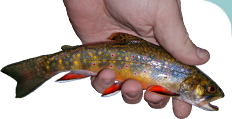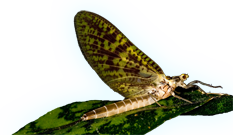Blog & Latest Updates
Fly Fishing Articles
Insects by Common Name


> > life cycle
| Ladder34 | June 24th, 2011, 4:17 pm | |
| Posts: 1 | can anyone tell me the life cycle for a sulphr fly...from the begining to the end...and which flies to use for each stage...I would truely appreciate any and all help. Thank You Mark A. Pryor Ladder 34 Philadelphia Fire Dept | |
| JOHNW | June 24th, 2011, 5:06 pm | |
| Chambersburg, PA Posts: 452 | Mark, Sulphur is a common name for a whole host of different mayflies which are pale yellow to almost sherbert orange. But basically in non scientific/over simplified terminology (or more appropriatly pattern specific teminology) the life cycle goes something like this: Nymph (the little thing that crawls on the bottm of the stream)-----emerger (any point when the nymph leaves the bottom of the stream until it pops out of its skin/shuck.-------dun (the adult fly which often rides the current for a few seconds before flying off to the trees to molt)---------spinner(the sexually mature fly that mates and the falls dead to the stream after doing the deed and laying eggs) Speciffic patterns for each stage can include: Nymph------------------------------------------------- Pheasant tails (with/without beads) Thinly tied hairs ear nymphs leaning toward brown. Emerger------------------------------------------ Any nymph pattern to match size and color with a tuft of CDC or Muskrat fur protruding at the wing case is a good start. Soft hackled wet flies in appropriate size and color Klinkhammers Quigley Cripples Dun-------------------------------------------------- Any pattern that has the name "dun" is probably a good start as long as it is close in size and color. Patterns to imitate the done stage are probably the most prolific/extensive. For the most part with mayflies you go with the a style of dry fly that is appropriate in size and color i.e. Standrd/Catskill, Parachute, Comparadun. What style to use on a given water is the subject of entire books and a source of debate in many circles. Spinner---------------------------------------------- This life stage is considerably easier (in my opinion) to narrow down the choices. The most significant feature of this stage is the wings laying flat to the side of the body of the fly in what is called a "spent" position. For Sulphurs these are rusty brown to dirty tan in color. From you location I would wager to say the sulphur hatch is over unless you will be traveling to one of the eastern tailwater rivers or perhaps extreme northen New England. The good thing is the same life cycle applies to the broad majority of mayflies and as such can be used as a general guide by just varying the size and color of the pattern. JW P.S. you could just simplify the whole mess by using a LYB (little yellow bastage) But I'll leave htose patterns to Spence | |
| "old habits are hard to kill once you have gray in your beard" -Old Red Barn | ||
| Sayfu | August 28th, 2011, 9:01 am | |
| Posts: 560 | Here is a problem we have out West. PMD's, when they come out in the riffles, come out like clockwork, day after day, for several months. At first, it is easy to catch fish on dries, standard, comparaduns work well, sparkle duns, etc. Then the fish get spooky, and you can see fish taking just under the surface. My soft hackles work fairly well, but there are times when they do not work. It has been suggested that fish turn very selective to rising nymphs, and the trigger is a "twitch" of that nymph at emergence that causes the fish to take that is hard to duplicate...dunno, but if fish are fished over hard on sulfurs in the riffles, you can go through all the stages, and not get a take...at least out West here. An interesting aspect on the SF of the Snake is the fish take a lt. pink tied Sulfur I will call them better than the pale yellow color that many of them are. | |
Quick Reply
You have to be logged in to post on the forum. It's this easy:
Related Discussions
| Title | Replies | Last Reply |
| A general understanding of BWO patterns In Fly Tying by AndyV | 0 | |
| Re: Site updates from May 16, 2012 In Site Updates by Bnewell | 3 | Jun 12, 2012 by Troutnut |
| Re: What size are damselflies? In Argia Damselfly Nymph by Adirman | 1 | Jun 28, 2012 by Entoman |
| Re: I'm back In General Discussion by Wbranch | 6 | Apr 2, 2022 by Oldredbarn |
| Re: Smallmouth bass In Fishing Reports by Wbranch | 7 | Oct 27, 2015 by Jmd123 |
| Re: Sexy Shad Clouser Minnow In Fly Tying by Mcflyangler | 1 | Jun 10, 2016 by Wbranch |
| Re: Buying Materials In General Discussion by GldstrmSam | 3 | Nov 28, 2011 by GldstrmSam |
| I agree with the nymph and emergence coments above In the Mayfly Species Litobrancha recurvata by Beardius | 0 | |
| Re: light & dark cahill nymph patterns In General Discussion by Lastchance | 2 | Feb 18, 2008 by JAD |
| Gills In General Discussion by Wbranch | 0 |
Troutnut.com is copyright © 2004-2024 Jason
Neuswanger (email Jason). See my FAQ for information about use of my images.
 privacy policy
privacy policy

